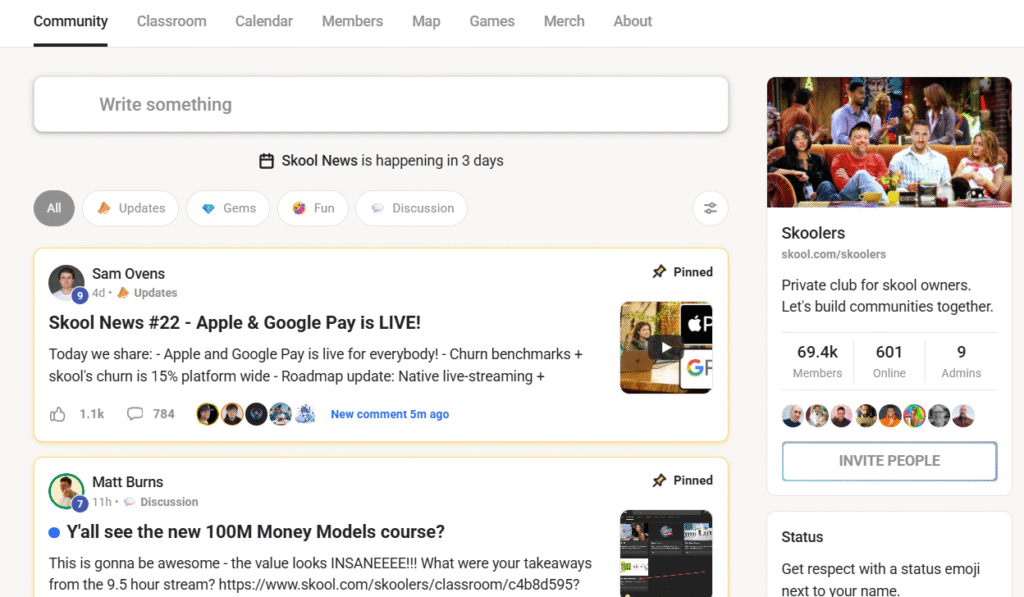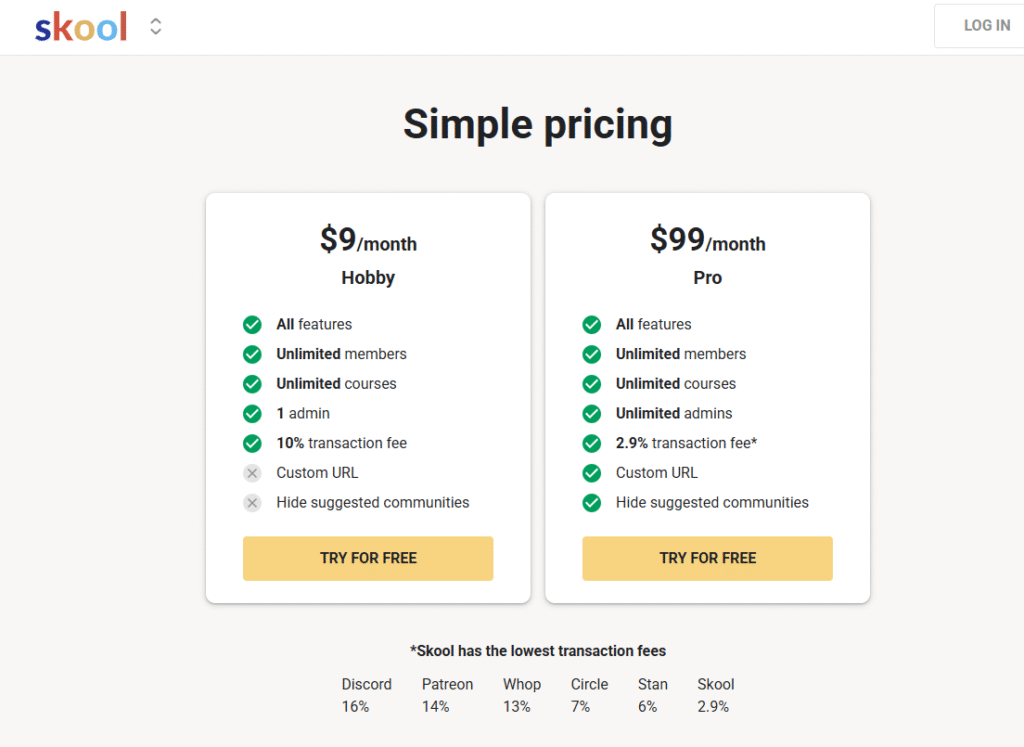If you’ve seen creators mention “Skool” but still don’t understand what it actually is, you’re not alone. Most platforms today are cluttered with hype, integrations, and hidden fees, Skool is different.
We will talk what Skool is, how it works, what it costs, and why it’s helping regular people turn their knowledge or passion into real income. This Skool review will help you decide if this platform is right for you or not.
What Is Skool Platform? Platform Review
Skool is a platform that combines three things in one place:
- A community forum
- A course/classroom system
- A calendar for events or calls
It’s designed for creators, coaches, educators, and small business owners who want to build and monetize a community around their knowledge.
Think of it as a cleaner, distraction-free version of Facebook Groups + Kajabi + Zoom all in one. No ads. No clutter. No complex setup.
How Does Skool Work? Step-by-Step
- Create Your Group: Sign up, name your group, write a short description, and choose your pricing (free or paid).
- Set Up Your Classroom: Upload your videos, PDFs, or templates. Organize them into lessons or full courses.
- Schedule Events: Add calls or live sessions to the calendar. Members get notified automatically and can join with one click.
- Invite Members: Share your group link. People can join for free or pay through Skool’s built-in payment system.
- Engage the Community: Members post updates, questions, or wins. You can reply, like, and run polls to keep things active.
- Gamify the Experience: As people participate, they earn points and unlock new levels. It turns learning into a challenge.
This is what makes the Skool platform different. One login. One dashboard. Everything runs in one place. They even have a skool app, which is the mobile version of the platform. It lets members join groups, watch lessons, comment in threads, and attend events, all from their phone. Whether you’re running a coaching program or joining a community, the app makes it easy to stay connected.
Who Uses Skool?
Skool works for online coaches building a group, course, or small online business. It helps you run everything in one place.
- Course creators
- Niche educators (like calligraphy or crypto)
- Fitness trainers
- Musicians, artists, or hobbyists
- Consultants and service providers
But also: anyone who wants to monetize what they already know. Skool works even if you don’t have a big audience or an existing course.
Skool Features (Plain and Simple)
Here’s what you get with every Skool group:
– Community Feed: Like a forum. Members can post, comment, ask questions.
– Classroom: Upload lessons, templates, videos, or PDFs.
– Calendar: Host live calls or add events for your group.
– Levels: Gamify the experience based on engagement.
– Leaderboard: Members who participate more rank higher (drives activity).
– Search: You and members can find anything instantly.
– Payments: Built-in system for subscriptions. No tech headaches.
– No plugins. No design work. It’s simple by design.

How Much is Skool? Skool Pricing Explained
Skool keeps it simple. One price. One plan.
- $99/month per group
- Unlimited members
- No extra fees for classroom, calendar, or payments
- You can charge your members whatever you want
There’s also a $9 trial to test the platform.

Some creators start with a free group and later switch to paid. Others go straight to paid access from day one. Typical pricing ranges:
- $20–$50/month for niche groups
- $100+/month for advanced skills or coaching
- One-time fees for lifetime access or templates
Skool doesn’t take a cut from what you earn. You control the pricing. Skool provides the tools.
How Skool Compares to Other Platforms
| Platform | Community | Courses | Calls/Events | Pricing |
|---|---|---|---|---|
| Skool | ✅ | ✅ | ✅ | $9 or $99/month flat |
| Kajabi | ❌ | ✅ | ❌ | Starts at $149 |
| Facebook Groups | ✅ | ❌ | ❌ | Free (but noisy) |
| Circle | ✅ | ✅ | ❌ | $49–$99/month |
| Discord | ✅ | ❌ | ❌ | Free (but messy) |
Skool is optimized for simplicity, focus, and monetization. It gives you fewer distractions and better tools in one place.
Can You Make Money With Skool?
Yes. And many people already are. There are communities on Skool making:
- $1,000–$10,000/month from small niche groups
- $30,000–$100,000+/month from coaching or hybrid models
- $300,000+/month like the solo AI creator behind Maker School
These are not hype numbers. The model works because Skool rewards depth, not just reach.
How people monetize on Skool:
- Monthly subscription for access to content and community
- Tiered memberships (ex: basic access vs. premium with calls)
- Paid coaching or templates offered inside the group
- One-time entry fees for lifetime access
You don’t need a big following. You need a clear promise, a consistent presence, and a system that gets results.
Real Examples of Skool Communities
Here are some real types of groups growing on Skool, and how much you can make :
- AI + Automation: Teaching beginners how to sell simple AI services
- Pickleball Coaching: Monetizing a local sport into a global group
- Painting & Drawing: Artists offering guided video lessons and critiques
- Digital Product Creators: Selling Canva templates or Notion systems
- Freelancer Communities: Support and systems for landing better clients
- Mompreneurs, fitness trainers, homeschool parents, Shopify devs…
If your niche helps people reach a goal, learn a skill, or avoid pain there’s a group waiting to join.
How to Start Your Skool Group (Step-by-Step)
- Choose Your Topic
Pick something you know well, even if it feels “too small.” The tighter the niche, the better. - Decide on Free or Paid Access
Start free to build momentum, or start at $20–$50/month with a strong promise. - Set Up Your Group
Use Skool’s $1 trial. Add:- A short welcome video or pinned post
- A few lessons or guides in the classroom
- A calendar with 1–2 optional calls or check-ins
- Invite Your First 10 People
DM followers, past clients, or friends. Ask for feedback. Get them to post something so the group feels alive. - Engage Every Day
Reply to every comment. Share tips. Highlight member progress. - Raise Your Price Over Time
As your group grows, add more value and increase pricing.
Why More Creators Are Switching to Skool
Most creators are tired of juggling:
- A course platform (Kajabi)
- A Facebook group (for engagement)
- Zoom (for calls)
- Stripe or PayPal (for payments)
Skool replaces all of them. And it’s easier to use. You get fewer tools. But you get more done.
That’s why creators are moving everything into one platform and focusing more on helping people instead of managing tech.
Is Skool Worth It?
If you want to build a paid community or a content-driven business, this Skool review should make it clear that:
- It’s clean and fast.
- It’s easy to maintain solo.
- It’s made to help you earn without all the complicated stuff.
Whether you’re teaching AI, fitness, finance, or even a personal hobby Skool lets you monetize your passion in a real way.
✅ Try Skool for $9
Curious to try it yourself?
You’ve got the knowledge. Skool gives you the platform to turn it into income.



4 comments
break down what an AI automation agency does, how to start one, how to price services, and which Skool communities are actually teaching the business model
Hey, I just stumbled onto your site… are you always this good at catching attention, or did you make it just for me? Write to me on this website, my username is the same, I’ll be waiting.
To learn more about our affordable advertising options and how they can benefit your website, Your success is our priority!
Together, let’s push the boundaries